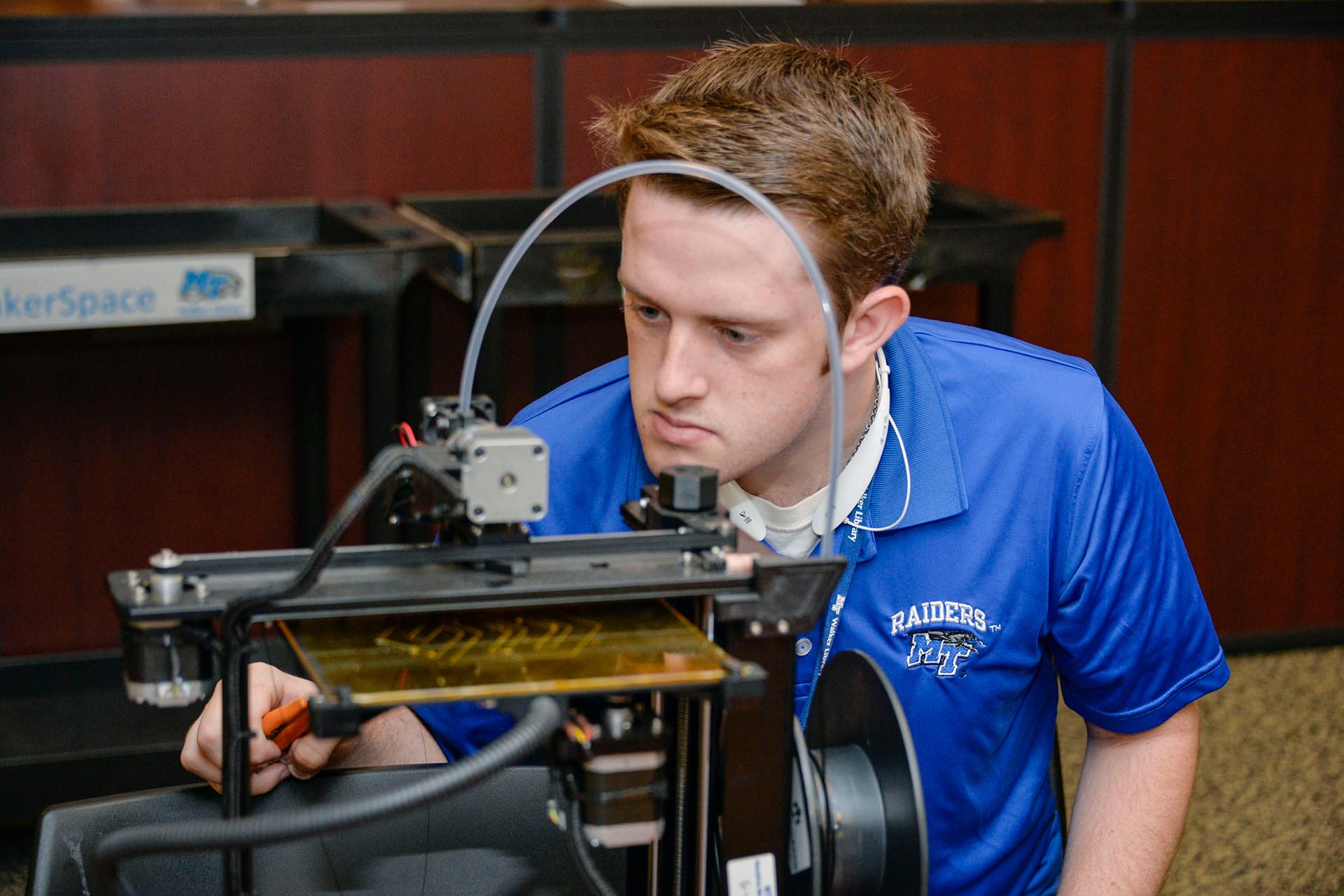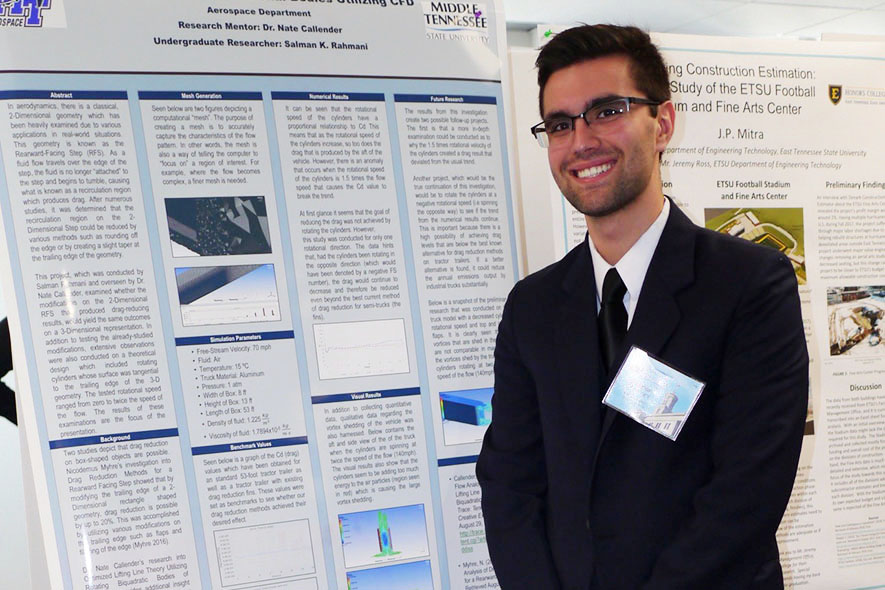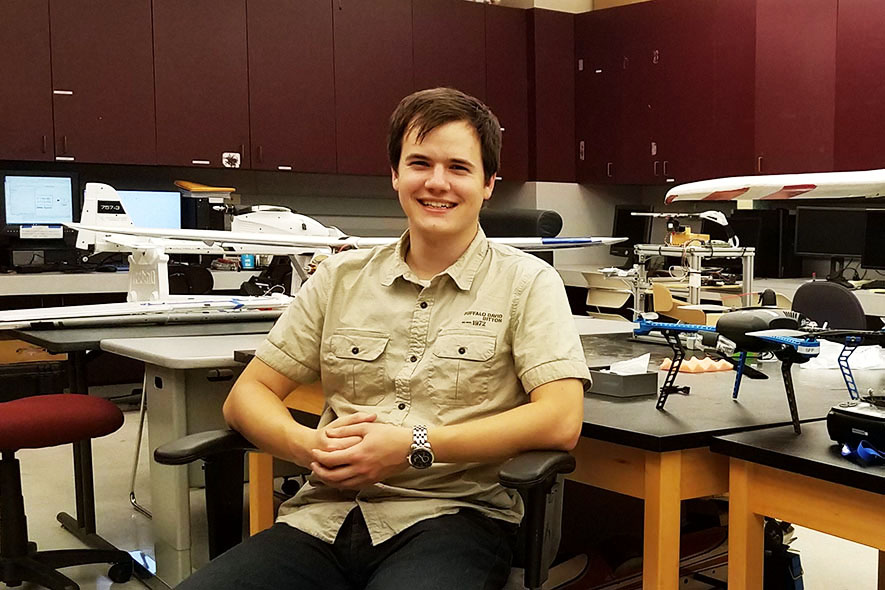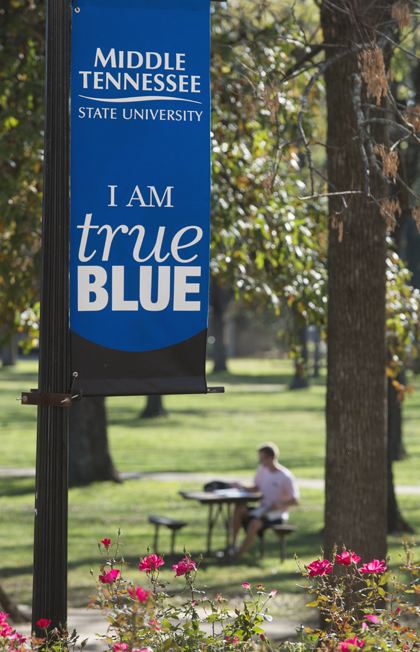
Aerospace
Shape the future of aerospace with MTSU's Aerospace Technology concentration.
Aerospace, Technology Concentration, B.S.
MTSU's Aerospace Technology concentration prepares students to become the leaders of the next generation of aerospace professionals by developing the needed knowledge, skills, and attitudes necessary for their careers.
The Aerospace Technology concentration offers preparation for students who want to pursue advanced study at the graduate level. Students complete coursework in math, science, engineering technology, and more. Students must complete minors in both Mathematics and Engineering Technology. Aerospace Technology students have access to a variety of research resources such as wind tunnels, water tunnels, small, unmanned aircraft, computational fluid dynamics (CFD) software operating on workstation computers, and undergraduate grant funding provided by MTSU's Undergraduate Research and Creative Activities (URECA) program.
If you live in one of these states: MD MS SC VA WV; you may be able to attend MTSU at in-state rates under the Academic Common Market program.
News Briefs

Undergrad research opens doors to the future
As Salman Rahmani looks back on his time studying Aerospace Technology at MTSU, he says, "The research opportunities I had as an undergraduate were great and made a difference to me personally as well as made me stand out when I applied for graduate study." His most recent research project, for which he received his fourth URECA grant, shows significant promise. The work rests on the creation of a digital wind tunnel in which different propellers are tested. "I'm super excited about this project in which my mentor and I tried to simulate the rotating motion of a propeller while keeping it stationary. As far as we know, this hasn't been done before," Rahmani explains, adding that the math and physics behind the work is extremely complex as in other projects he has worked on with Dr. Nate Callender. Rahmani says his undergraduate research, along with support from the Undergraduate Research Center, was a significant factor in scholarship offers he had for graduate study. "I have a decent GPA but didn't score well on the GRE exam." Even so, he had two excellent offers and plans to pursue a doctorate at University of Kansas. Rahmani, who was born in Macau, China, says that early focus on math and science helped prepare him for aerospace technology. His family came to the US in 2002 and settled in Tennessee near relatives. He says that he isn't naturally gifted and has to work hard, often getting by on little sleep. "But hard work beats out talent — or at least gives you an opportunity," says the successful young man, who hopes eventually to turn his research talents to high-speed motor sport racing.

Program leads talented student to graduate study
Nick Myhre's educational career is moving along rapidly. Just two years after receiving a B.S. in Aerospace Technology, he's graduating with a master's from Embry Riddle Aeronautical University, Daytona Beach, Florida, and he will immediately pursue a Ph.D. there in aerospace engineering. He says he went to Embry Riddle to work on space probes, explaining, "Since vehicles don't have access to GPS signal in deep space, visual cues must be substituted to estimate relative position when navigating near an asteroid, for example. The visual navigation algorithm was tested using a quadcopter UAV." Myhre hopes eventually to work in the space industry, perhaps on rockets. His undergraduate research on reducing drag on non-aerodynamic bodies using rotating cylinders pointed him toward graduate work. Also, a factor was his decision to double major; this made sense when he came to MTSU to study Aerospace Technology since the program requires significant amounts of math and science. He remembers that Dr. Eric Klumpe, Physics, and Dr. Nate Callender, Aerospace, encouraged him; Myhre recommends double majoring to others in Aerospace Technology: "I found it very helpful, and it broadens opportunities. You take so many of the courses anyway that a major isn't that much more." He's also grateful to Dr. John Vile, dean of MTSU's Honors College, for helping shape his education, along with the overall quality of teachers at MTSU. Myhre says he originally wanted to follow in his father's footsteps and be a pilot, but his success with math and science indicated a different path. He takes breaks from his challenging studies by playing chess, guitar, and piano and by going to the beach.
News Briefs
Undergrad research opens doors to the future

As Salman Rahmani looks back on his time studying Aerospace Technology at MTSU, he says, "The research opportunities I had as an undergraduate were great and made a difference to me personally as well as made me stand out when I applied for graduate study." His most recent research project, for which he received his fourth URECA grant, shows significant promise. The work rests on the creation of a digital wind tunnel in which different propellers are tested. "I'm super excited about this project in which my mentor and I tried to simulate the rotating motion of a propeller while keeping it stationary. As far as we know, this hasn't been done before," Rahmani explains, adding that the math and physics behind the work is extremely complex as in other projects he has worked on with Dr. Nate Callender. Rahmani says his undergraduate research, along with support from the Undergraduate Research Center, was a significant factor in scholarship offers he had for graduate study. "I have a decent GPA but didn't score well on the GRE exam." Even so, he had two excellent offers and plans to pursue a doctorate at University of Kansas. Rahmani, who was born in Macau, China, says that early focus on math and science helped prepare him for aerospace technology. His family came to the US in 2002 and settled in Tennessee near relatives. He says that he isn't naturally gifted and has to work hard, often getting by on little sleep. "But hard work beats out talent — or at least gives you an opportunity," says the successful young man, who hopes eventually to turn his research talents to high-speed motor sport racing.
Program leads talented student to graduate study

Nick Myhre's educational career is moving along rapidly. Just two years after receiving a B.S. in Aerospace Technology, he's graduating with a master's from Embry Riddle Aeronautical University, Daytona Beach, Florida, and he will immediately pursue a Ph.D. there in aerospace engineering. He says he went to Embry Riddle to work on space probes, explaining, "Since vehicles don't have access to GPS signal in deep space, visual cues must be substituted to estimate relative position when navigating near an asteroid, for example. The visual navigation algorithm was tested using a quadcopter UAV." Myhre hopes eventually to work in the space industry, perhaps on rockets. His undergraduate research on reducing drag on non-aerodynamic bodies using rotating cylinders pointed him toward graduate work. Also, a factor was his decision to double major; this made sense when he came to MTSU to study Aerospace Technology since the program requires significant amounts of math and science. He remembers that Dr. Eric Klumpe, Physics, and Dr. Nate Callender, Aerospace, encouraged him; Myhre recommends double majoring to others in Aerospace Technology: "I found it very helpful, and it broadens opportunities. You take so many of the courses anyway that a major isn't that much more." He's also grateful to Dr. John Vile, dean of MTSU's Honors College, for helping shape his education, along with the overall quality of teachers at MTSU. Myhre says he originally wanted to follow in his father's footsteps and be a pilot, but his success with math and science indicated a different path. He takes breaks from his challenging studies by playing chess, guitar, and piano and by going to the beach.
Related Media

As one of the Department's oldest concentrations, the Technology program has supplied qualified individuals to graduate schools and to the work force for quite some time. Universities into which Technology students have matriculated for graduate study include, but are not limited to, the following:
- Kansas State University
- The Ohio State University
- The University of Tennessee
- Embry Riddle Aeronautical University
- Syracuse University
- North Carolina State University
Careers for Technology graduates include, but are not limited to, the following:
- Aerospace Engineering
- Flight Test Engineering
- Mathematics
- Physics
Employers of Technology concentration alumni include, but are not limited to, the following:
- HondaJet
- Lockheed Martin
- Spirit Aerosystems
- The Air Force Research Laboratory
- Triumph Aerospace



For additional information specific to the Aerospace Department, including information on scholarships specific to Aerospace students, please visit the Aerospace Department website.

CONTACT US

Please fill in the form below and we will contact you very soon











